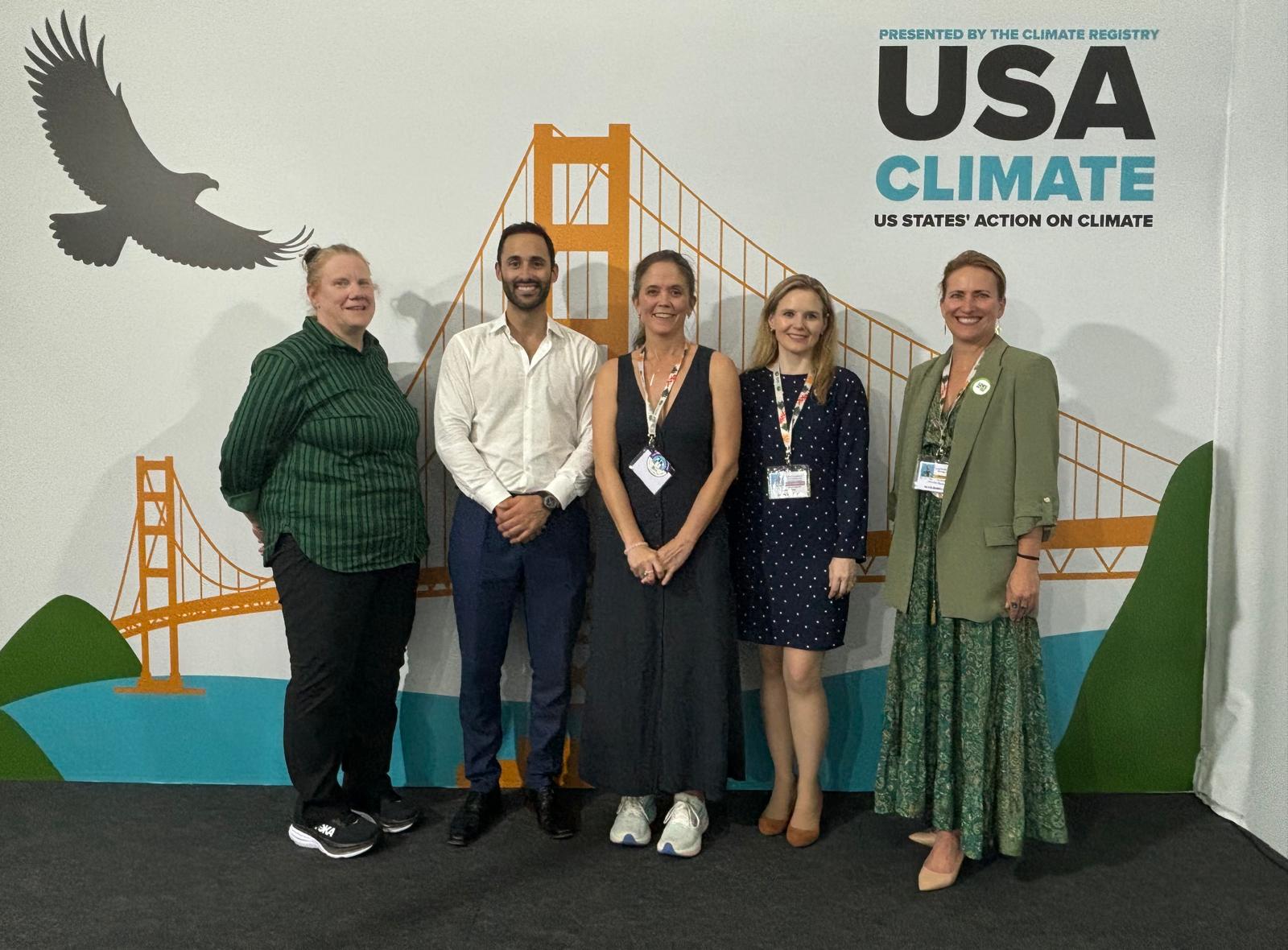At the USA Climate Action Pavilion, BCSE convened four industry leaders to share the latest on technologies that are driving deep emissions cuts across industry, buildings, and transportation. Lisa Wee, Chief Sustainability Officer, AVEVA highlighted the power of digital transformation and AI to boost industrial efficiency and speed up clean technology deployment. Carlos Garcia, Head of Methane Markets, STX Group emphasized market-based solutions for methane reduction, creating economic incentives for verified emissions cuts.
Julia Souder, Chief Executive Officer, Long Duration Energy Storage (LDES) Council, spotlighted long-duration storage as key to a reliable, affordable, 24/7 clean energy system. Helen Walter-Terrinoni, Director, Global Climate Policy, Trane Technologies underscored the role of efficiency and load shifting in managing demand.
Speakers included:
- Carlos Garcia, Head of Methane Markets, STX Group
- Julia Souder, Chief Executive Officer, Long Duration Energy Storage Council
- Helen Walter-Terrinoni, Director, Global Climate Policy, Trane Technologies
- Lisa Wee, Chief Sustainability Officer, AVEVA
- Moderator: Laura Tierney, Vice President, International Programs, BCSE
Key takeaways:
Lisa Wee, Chief Sustainability Officer, AVEVA
- Digitalization for Decarbonization: Most industries are only ~30% digitized. AVEVA aims to build a digital backbone that enables real-time data and AI integration across operations, making processes more efficient and sustainable.
- Applications in Energy Transition:
- Existing Energy Infrastructure: Helping optimize and decarbonize existing assets, especially as companies transition to bio-based and circular fuels.
- Commercial Viability: Driving efficiency and performance in emerging energy solutions.
- Innovation Enablement: Using AI and digital tools to accelerate commercialization of technologies like fusion, hydrogen, and long-duration storage.
- Artificial Intelligence: AVEVA recognizes AI’s growing electricity demand but stresses that not all AI is energy-intensive. Many machine learning tasks use minimal energy. The lack of global standards for measuring AI’s carbon impact is a major issue; AVEVA calls for global frameworks and the principle of “no random acts of AI.”
- Policy: Advocates for consistent and globally aligned policy. They foresee a multi-polar energy world, where different regions follow varied regulatory paths, but still need common standards for global coordination.
Carlos Garcia, Head of Methane Markets, STX Group
- Core Activities: Trades products with positive environmental externalities — including biogas, biofuels, energy efficiency credits, and methane markets.
- Pioneering the first methane compliance market under the EU Methane Regulation, aiming to link emission reduction performance to market value.
- Market Philosophy:
- Market Over Mandate: STX promotes market-based solutions rather than punitive regulation. By rewarding producers who exceed compliance, they create positive economic incentives for decarbonization.
- Data and Verification: Emphasizes granular, high-quality data for credible verification and valuation of emissions performance.
- Local Impact: Credits are localized to ensure emissions reductions align geographically with production.
- Methane as a Climate Lever: Methane reduction offers a rapid “emergency brake” for climate impacts — reducing emissions by 30% can yield a 25% climate benefit within 20 years.
- Perspective on COP: Views COP as an essential forum to connect influential leaders and drive practical, market-based climate progress.
Helen Walter-Terrinoni, Director, Global Climate Policy, Trane Technologies
- Load Shifting:
- Energy peaks occur during hot summer days and cold nights; the grid is built for these peaks.
- Managing (flattening) these peaks through load shifting—storing energy during off-peak hours—reduces grid strain and investment needs.
- Policies around data center energy use during peaks reflect this evolving challenge.
- Efficiency and Resilience:
- “The lowest-cost energy is the electron I don’t use.”
- Emphasizes local energy exchange and efficiency as key to reducing costs and improving resilience.
- Advocates for passive cooling standards to support heatwave resilience.
- Collaboration: Supports the COP framework as a cooperative space for cross-sector solutions — recognizing that grid investors don’t always reap direct returns, but contribute to broader system benefits.
Julia Souder, Chief Executive Officer, Long Duration Energy Storage Council
-
- Technology and Market Focus: Promotes both short- and long-duration solutions (8+ hours), spanning:
- Clean heat storage
- Pumped hydro
- Electrochemical (lithium iron, zinc)
- Chemical (hydrogen, ammonia)
- Current installed capacity is 0.22 TW — with a goal of 8 TW globally, requiring major policy and investment scaling.
- Lists bankable LDES technologies on its website.
- Value Proposition: LDES adds flexibility, durability, and affordability to grids and data centers.
- Proven by 10+ member companies with projects under construction.
- Can replace natural gas and provide 24/7 renewable heat or power reliability.
- Technology and Market Focus: Promotes both short- and long-duration solutions (8+ hours), spanning:
- Market and Policy Landscape:
- No single market leader yet — China and Australia are active, while the U.S. and U.K. have slowed due to mixed policy signals.
- South Africa exploring new procurements.
- LDES is at “the bottom of the hockey stick” — on the cusp of large-scale adoption.
- Core Benefits:
- Reliability services (e.g., behind-the-meter systems).
- Round-the-clock clean energy supply.
- Enhances affordability and stability of grids.
- Promotes public-private collaboration for scale and trust.
DETAILS

